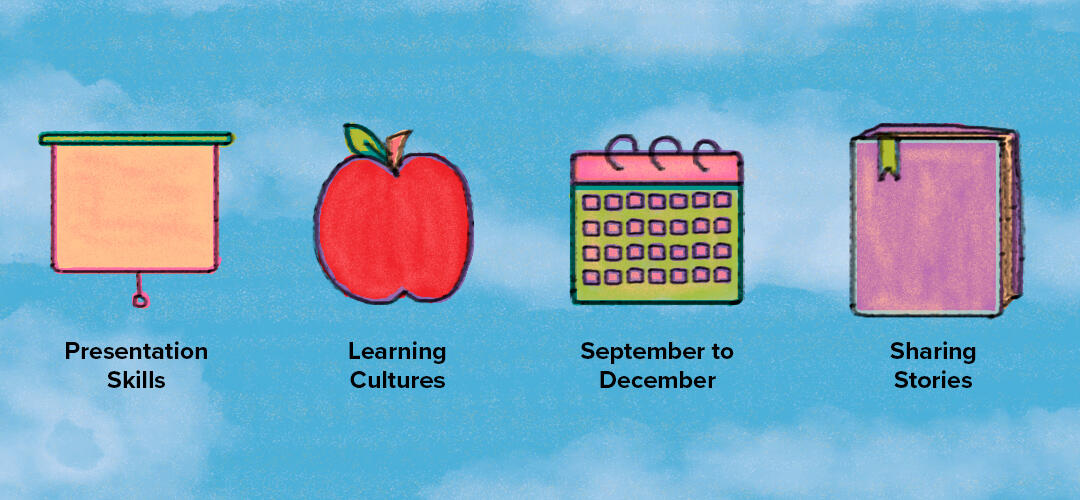Sharing Stories, Learning Cultures
Culture Collage is a multi-dimensional intercultural learning program that connects post-secondary international students with local children and allows them to share their stories. By hearing these stories and participating in various interactive activities (facilitated by pre-service teachers) the elementary students will begin to grow intercultural awareness. The program is rooted in intercultural competence theory and is aiming to provide a learning opportunity for teachers and students alike.

Culture Collage is seen as a way to breathe life into the discussion of “culture”, by giving faces, names, and stories to places that elementary school children may have only read about. This program, where students can learn from true representations of culture, will build empathy and understanding for the many cultural others that youth will experience – a valuable skill in today’s world. Born from a vision that was years in the making, 2019 marks the first pilot of this program with hopes that it will spread and change understanding for years to come.
Program Goals
- To build greater intercultural awareness in local elementary school students
- To provide an opportunity for post-secondary international students to build their skills and share their stories
To provide an opportunity for pre-service teachers to plan and facilitate a structured inquiry unit on intercultural competence
Benefits
| Audience | Benefits |
|---|---|
| Elementary Students |
|
| Post-Secondary International Students |
|
| Elementary School Teachers |
|
| University Faculty of International Education |
|
Connection to the BC Curriculum
The Culture Collage learning objectives directly support the development of the three core competencies outlined in BC’s new curriculum:
C: Communication T: Thinking PS: Personal and Social
| Learning Objectives | Competencies |
|---|---|
Curiosity, Discovery and | T: Question and Investigate |
Respecting and Valuing Other Cultures | PS: Valuing Diversity |
Openness and Withholding Judgment | C: Connect and Engage with Others |
Schedules
- Introduction: Connecting Across Cultures
- Interactive Presentation by VIU International Students – Representing Country #1
- Interactive Presentation by VIU International Students – Representing Country #2
- Interactive Presentation by VIU International Students – Representing Country #3
- Interactive Presentation by VIU International Students – Representing Country #4
- Wrap-Up: Reflection and Evaluation
International Student volunteers are expected to be available for the following dates:
| Training Dates | Elementary School Class Visits | Wrap-Up Evaluation |
|---|---|---|
| September 13 | Week of November 4-8 | December 13, 1-2pm |
| September 27 | Week of November 18-22 | |
| October 4 | Week of November 25-29 | |
| October 11 | Week of December 2-6 | |
| October 18 | ||
| October 25 |
Participants
Culture Collage is an innovative and educational volunteer opportunity that will connect international students from Vancouver Island University with local children and allow them to share their story. As a Culture Collage volunteer, they’ll receive 6 weeks of training that includes leadership development, presentation skills, and intercultural awareness. After completing the training, they’ll visit elementary schools around Nanaimo to introduce their own culture to children in grade 3 classes (three 1.5-hour class visits over a 4-week period).

VIU Pre-Service Teachers
A self-paced online D2L course on Effective Intercultural Communication. The course is free and offers recognition on your co-curricular record. Attached is an outline of the course.
Resources
Teacher Resource Guide
This teacher resource guide is designed to help pre-service teachers implement Culture Collage in the classroom. Included in the guide is a summary of what Culture Collage is, some helpful key terms, the theory behind the program, and some activities to do with elementary students.
Culture Collage: Teacher Resource Guide
Activity Print-Outs
Tia: Pink or Yellow?
Everyday Communication
Cultural X-Rays
Notable Books for a Global Society. Annually, a committee of the CL/R SIG (Children’s Literature and Reading Special Interest Group) of the International Literacy Association selects 25 outstanding trade books for enhancing student understanding of people and cultures throughout the world. The committee reviews books representing all genres intended for students K-12.
Notable Books for a Global Society
The Name Jar by Yangsook Choi. Recommended by the BC Teachers’ Federation, this book includes pre- and post-reading activities. The pre-reading activities found at this link would be excellent complementary activities and could be used without the book.
Here Comes Everyone: Teaching in the Intercultural Classroom. Developed by the Alberta Teachers’ Association, Here Comes Everyone is organized into six chapters representing the continuum from cultural perspective to intercultural understanding.
Here Comes Everyone: Teaching in the Intercultural Classroom
OECD Transformative Competencies for 2030. According to the OECD, there are three “transformative competencies” that students need in order to contribute to and thrive in our world, and shape a better future. Two of the three (reconciling tensions and dilemmas, and taking responsibility) are especially pertinent to intercultural learning.

